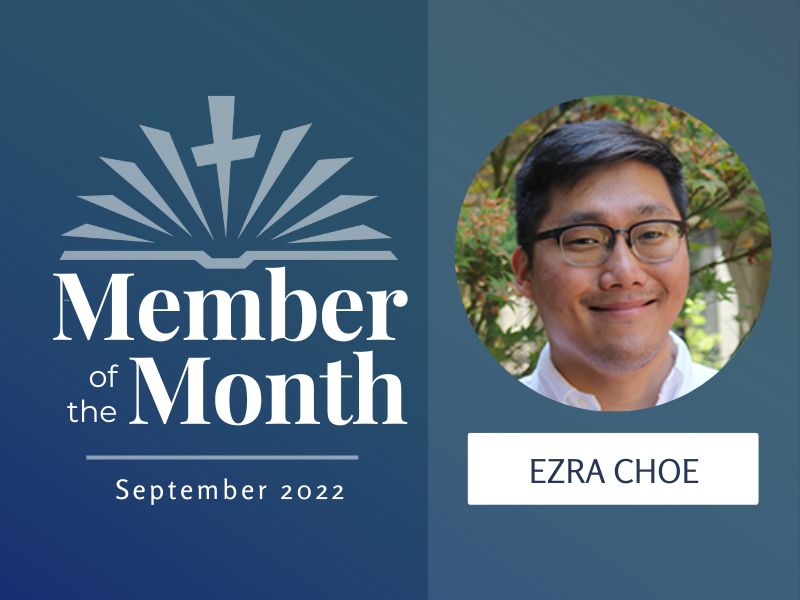Ezra is the Theology and Philosophy Librarian at Baylor University in Waco, TX (20,626 FTE). This is Ezra’s first year as an ACL member.
Describe yourself using a book title: Confessions
What’s the best thing about being a librarian? The best thing about being a librarian is building relationships with patrons and helping them in their intellectual journey.
What are you currently reading? On Social Justice (homilies) by St. Basil the Great
Describe ACL in three words: Community, Christian, Friendly
How do you (or How have you), as an academic librarian, contribute to your campus? At my current workplace, I am working hard to (i) develop instruction sessions with special collections materials, (ii) engage in academic research, particularly in applied virtue ethics, and (iii) engage in community outreach with faculty members and students.
More specifically, to engage with our Baylor community, I try to attend all events/talks/colloquiums offered by my subject departments. I maintain healthy relationships with graduate students and update them on acquisitions. I am involved with student organizations, and I am planning on a student reading group with one particular student organization. I meet students over coffee to discuss their classes and readings. All these forms of outreach are not necessarily quantifiable, but I believe this approach is worthwhile since we are by nature relational rather than just transactional creatures.
I began my career as a librarian…during the middle of the pandemic! I graduated in the Spring of 2021, and I was blessed to find a job as a Reference and Instruction librarian.
What do you value about ACL? Its Christian identity
How were you introduced to ACL? I was introduced by librarians at Biola University. Dr. Gregg Geary first introduced me to the organization, but I also noticed fantastic librarians at Biola involved with the organization.
How are you or have you been involved in ACL? I attended the ACL Annual Conference for the first time in June. One thing I really appreciated was the fact that I felt welcomed at the conference. Everybody I had interactions with was charitable and made me feel comfortable and welcomed. I know that if I have questions about the profession, I can rely on members of ACL for advice and guidance. I was also amazed that there are so many things to learn in librarianship! I was impressed by all the presentations/workshops I attended. One helpful workshop was Librarians Navigating the Promotion and Tenure Process; it was eye-opening to hear seasoned librarians going through the promotion/tenure process.
Do you have any specific interests in the library world? My main interest is in information literacy and virtue ethics. Virtue ethics is a normative ethical framework that places emphasis on moral character or stable dispositions inherent in an agent. Virtues such as the cardinal virtues, i.e., prudence, temperance, justice, and fortitude are acquired and cultivated through practice. Christianity also posits theological virtues (faith, hope, and charity) in addition to the gifts of the Holy Spirit that cannot be acquired by one’s own doing. Applied virtue ethics simply means how virtues are applied in specific contexts, For example, I am interested in questions like what virtues should be emphasized in information literacy? How can librarians/instructors help students avoid vices like narrow-mindedness and negligence? Many Christian Universities have adopted this ethical framework, but not much has been written about how it intersects with librarianship. I am hoping to explore this more at Baylor because helping students cultivate virtues will help them flourish.
Digital humanities, especially text mining, is something that I am also deeply interested in. I started to get interested in Digital Humanities through studying St. Thomas Aquinas. Fr. Roberto Busa, partnering with IBM, started the Index Thomisticus – a complete lemmatization of Thomas Aquinas’s work. DH is hard to define because there are different methodologies and tools involved. Here’s one definition by Clifford Anderson: “My standard rubric is that the digital humanities applies computational methods to the analysis of classical problems in the humanities. This definition begs the question of the role of computational tools in theological research.” In short, advances in technology allows us to view problems in humanities in a different light. One of those methods is text mining. Text-mining is one way to approach DH – using computational analysis, one can uncover certain patterns or themes in large works. For example, using Roberto Busa’s Index Thomisticus, John Tomarchio was able to uncover the role of the modus principle in Aquinas’s thought. I think DH is important because librarians will increasingly be involved with DH methods and help researchers and students in their projects.
Lastly, due to the large amount of religious rare books materials in religion at Baylor University, I have increasingly become interested in rare books material.


